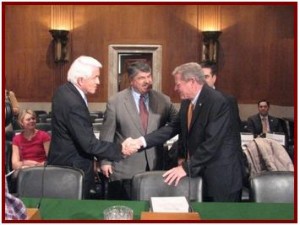During a hearing today in Washington, Democrats and Republicans postured over President Barack Obama’s proposal for a six-year, $556 billion highway bill with none of the partisans suggesting how it will actually be paid for.
This ducks the real issue of the ongoing decline in highway trust fund revenues that built the interstate system during the 1950s and contributed to what was then a booming American economy.
As it stands now our country needs to invest approximately $2.2 trillion through 2014 just to maintain our national infrastructure in a state of good repair, according to an American Society of Civil Engineers’ 2009 Report.
This means the existing transportation trust fund would need about $231 billion in additional revenue over the six-year period to fully pay for the proposed programs, according to Obama’s 2012 budget – and that’s if you believe in rosy political projections.
But don’t look for the leadership from either party to propose how they will pay for this. For years the U.S. Congress has refused to raise transportation funding through increased user fees.
“The Administration inherited a difficult problem — a system that can no longer pay for itself. There simply is not enough money in the Highway Trust Fund to do what we need to do,” said Secretary of Transportation Ray LaHood back in 2009 when the Obama administration punted the problem down the road by authorizing only short tem funding.
Now, here we go again: Senator Barbara Boxer said today at a hearing of the Senate Committee on Environment and Public Works that “2010 was a tough election and many of us found ourselves on different sides. But for everything there is a season – election season comes soon enough but now we have an obligation to work together for the American people – for jobs, for business and for our nation.”
This bankrupt Democratic platitude, with no funding proposals, was followed by a Republican one from Senator James M. Inhofe, the ranking member of the committee.
“The current problem with the Highway Trust Fund is that we have gotten away from the user pays, user benefits concept and are providing a free lunch to too many unrelated activities,” said Inhofe.
He went on to say, “I think this budget proposal will make it harder for Congress to get a bill done. But as we are discussing today, it is imperative that we get a good bill done soon. So I am going to treat this budget as yet another obstacle we have to overcome to enact a responsible, budget neutral bill this year.”
Okay so what fuel tax increases are you proposing?
On this core issue there was only silence. It’s nice to see the two parties finally working together on a hearing entitled “National Leaders’ Call to Action on Transportation.”


